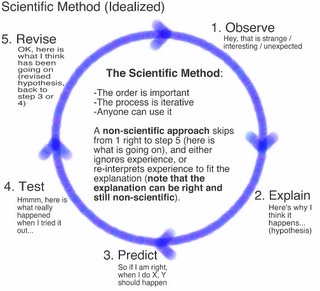Consider this illustration:

This model looks at the process of proving an idea- how many observations, reinforcing one another and independently verified, fit together into systems and areas of knowledge- and as these various systems provide mutual feedback and correction, these shared insights are used to direct, refine and finally produce a way of explaining some aspect of the world (a theory).
The diagram is labeled "idealized" because science is not really so cut and dry. For example, as often as not, a scientist is thinking about a particular kind of problem when she starts the cycle. Few, if any, people notice some random fact and start framing an experiment. More often, people are thinking about a particular kind of problem, and use this approach to figure out what is going on. What is important here is that instead of jumping to the conclusion, the person doing the experiment is asking good questions, performing tests to eliminate possible alternative explanations, and (hopefully?) listening to the data. This is not so much a procedure as a mindset.
Sometimes, we think we are closing in on an answer, and then everything is changed by new discoveries- for example, Newton's framework of physics was replaced by Einstein’s General Relativity- though keep in mind that Newton's laws still work- just not in as many instances as Einstein's - so this is really a case of a partial understanding being replaced by a more encompassing one.
And a few terms:
A fact is an observation that can be independently established by different observers.
A hypothesis is an explanation that accounts for observed facts. Click here for more.
A theory is hypothesis that fits all the observed facts. It has been tested by enough people over a long enough time to be generally accepted as true.
Given the above, a theory can never "graduate" to the status of a fact because they are not the same thing. Facts are the things explained by the theory. You can have so much confidence in a theory that it is not reasonable to deny the explanation. If facts are discovered that cannot be explained by the theory, then the theory is false, and has to be modified, or replaced by a theory that more accurately explains the facts. This is one reason why we are always reading about new discoveries that call some theory into question-it is the nature of science that we "know in part," and we revise our understanding as we go. This is actually a good thing, if it results in a more accurate understanding of our world.
There is no Single "Scientific Method"
"No single criterion yet formulated has succeeded in defining science completely, leading to two possible interpretations. Either we haven't found the all-sufficient definition yet, or it doesn't exist. The latter seems to be much more likely. Thus it is wrong to speak of the "Scientific Method". Rather, there is a constellation of scientific methods. The most robust definitions - those of widest applicability, most immune to abuse and capable of correcting errors - revolve around replication of results by independent observers and seeking ways to falsify theories."
http://www.uwgb.edu/dutchs/pseudosc/badmodl.htm

No comments:
Post a Comment